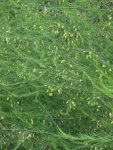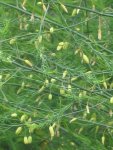Asparagus officinalis - asparagus officinalis
Family Asparagaceae.
Botanical characteristics. A perennial herbaceous plant with numerous strongly branching stems up to 1.5 m in height. It has a thick rhizome, from which a large number of roots leave, and vertical vegetative shoots. The leaves are very small, scaly, with filiform branches in their sinuses. Blooms in June. The flowers are greenish-white or greenish-yellow, small dicotyledons, and also false-foxed. Fruits - red berries are globular in shape, ripen in September.
Spread. In the wild, they are found in the European part of the country, in Western Siberia (except the Far North), in the Caucasus. Cultivated by amateurs as a delicious vegetable in gardens and orchards.
Used parts of the plant. Rhizomes with roots and young shoots.
Asparagine and arginine (up to 0.04%), steroid saponins, essential oil, vitamin A, carbohydrates, coumarin and chelidonic acid have been found in the roots and roots of asparagus.
Application. It is not used in scientific medicine. Has a strong diuretic effect, as well as hypotensive, sedative, antispastic and cholagogue. Asparagus increases heart rate and slows down their rhythm.
Preparations from the plant are prescribed for neuroses, hysteria, impotence, tachycardia, hypertension and atherosclerosis.
In traditional Chinese medicine, asparagus is a popular plant and is recommended for diseases of the gastrointestinal tract and liver, as an anti-inflammatory and improving digestion and appetite, for lung diseases, whooping cough, diabetes, gout and rheumatism.
The main advantage of the preparations from asparagus is their diuretic and anti-inflammatory effect. The plant is widely used in diseases of the kidneys, bladder, prostate, and edema due to cardiovascular and renal failure.
External use for various skin diseases. Asparagus imparts a specific unpleasant odor to the urine.
Preparation
- Decoction of rhizomes and roots of asparagus medicinal: 1 tbsp. L. Dry crushed raw material is poured into 0.5 liters of boiling water and boiled for 10 minutes. Defend, filter. Take 0.5 cup 4 times daily before meals with kidney disease, liver cirrhosis, hypertension, allergies.
- Decoction herbs asparagus medicinal: 1 tbsp. L. Dry crushed herbs pour 1 cup boiling water, boil for 5 minutes, filter. Take 0.5 cup 4 times daily before meals with cardioneurosis, tachycardia, toxic goiter, hypertension.
- Infusion of fruits of asparagus officinalis: Five berries are poured with 1 glass of boiling water and insist in a thermos 6 - 8 hours. Take infusion of 1 tbsp. L. Every 4 to 5 hours 3 to 4 times a day with impotence, hemorrhoids.
- Decoction of rhizomes and roots of medicinal asparagus (external): 1 tbsp. L. Crushed dry raw material is poured into 0.5 liters of boiling water and boiled for 10 minutes. Insist 20 minutes, filter. Used for lotions on pustular, eczematous, psoriatic and allergic skin lesions.
Homeopathy . It is used in the homeopathy of Asparagus 3 x in the treatment of cardiac patients. Characteristic symptoms: circulatory failure, accompanied by general weakness, pain radiates to the left shoulder, pulse small and weak. More suitable for elderly patients.





Comments
When commenting on, remember that the content and tone of your message can hurt the feelings of real people, show respect and tolerance to your interlocutors even if you do not share their opinion, your behavior in the conditions of freedom of expression and anonymity provided by the Internet, changes Not only virtual, but also the real world. All comments are hidden from the index, spam is controlled.